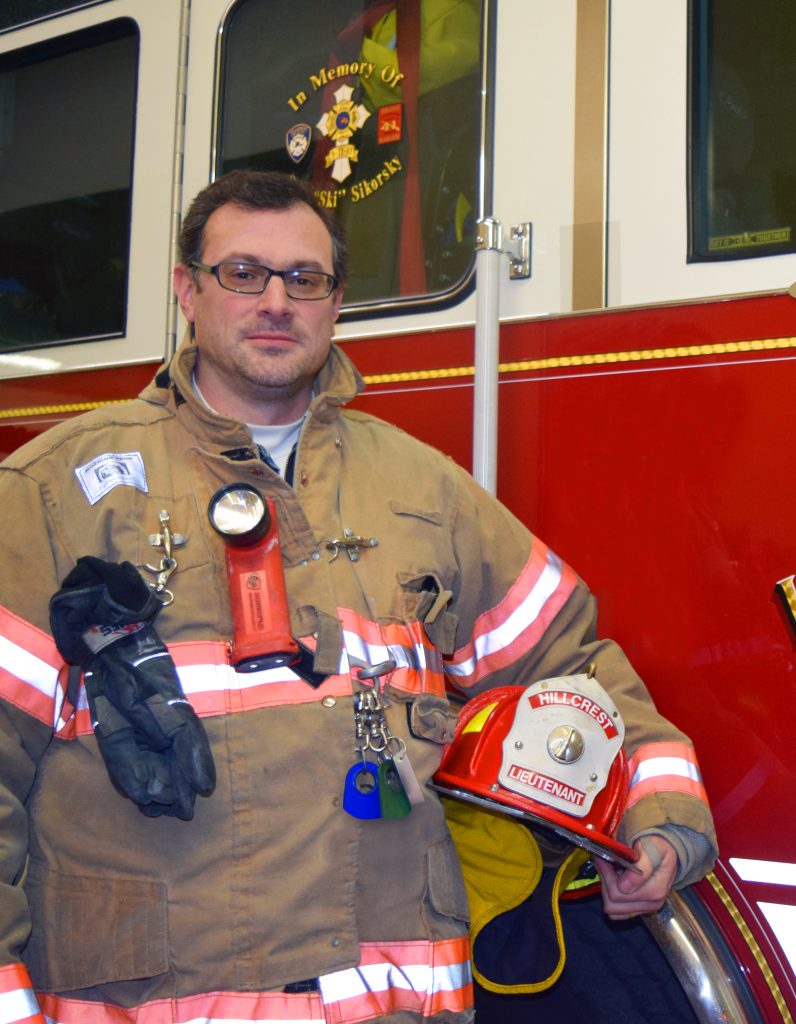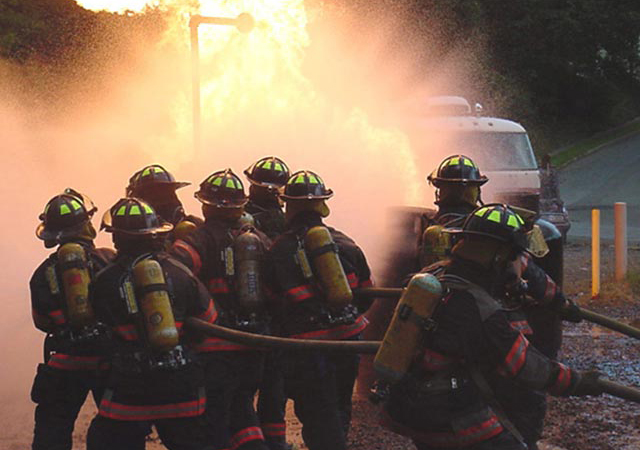
There’s something about cars that seems to fascinate little boys and Shlomo Pomeranz recalls being fascinated by one vehicle in particular when he was growing up on Lynne Court in Monsey.
“The fire chief lived right behind us and right outside my back door there was a nice, shiny chief’s car,” recalled Pomeranz. “It always intrigued me.”
As Pomeranz got older, his interest in firefighting grew with him. Returning to Monsey after learning in yeshivah in Israel he and his friends all trained as emergency medical technicians and decided to spend part of their time volunteering within their local communities.
“I loved driving big vehicles and it is a natural tendency among the chosen people to want to help others,” said Pomeranz. “Combine those two passions and you end up joining one of two volunteer services: most of my friend volunteered with Hatzolah, but I chose fire.”
Pomeranz, a father of three who recently became the full- time fire inspector for the Village of Airmont located just south of Monsey, has been an active volunteer firefighter for more than 25 years. He is the first lieutenant at the Hillcrest Fire Company, the second busiest fire company in Rockland County, which fields approximately 900 calls every year.
All of Rockland County’s firefighters are volunteers, leaving work and their families when duty calls.
“No one is ever on or off duty,” explained Pomeranz. “When the call comes in, if you can go, you go.”
Three of the five Monsey area fire companies have members who are shomrei Torah u’mitzvos. Of the ten frum volunteer firefighters volunteering with the Hillcrest Fire Company, four are Chasidic men and one is an Orthodox Jewish mother of two.
Pomeranz went with his father to Rabbi Berel Wein to discuss the relevant halachic issues about becoming a firefighter when he first came back from yeshivah. As a kohein, there were questions that needed to be answered about parts of his EMT training that required him to be in a hospital, and as a firefighter, Shabbos and yomim tovim were major issues that needed to be addressed.

“It is definitely a different way of life,” said Pomeranz’s wife, Adeeva Laya. “Hatzolah members and doctors also get calls that have them leaving the Shabbos table. This issue comes up so often in Jewish communities because volunteering and helping others is the Jewish way of life.”
Being a volunteer firefighter involves a major time commitment. In addition to going out on calls, volunteers perform weekly maintenance to ensure that all equipment is ready for the next fire as well as drills, training, company meetings and more. Pomeranz estimated that the average volunteer firefighter invests 10 to 20 hours per week engaged in fire-related activities.
While in places like New York City where being a firefighter is a paid position and the concept of a frum firefighter is virtually non-existent, the situation is different in suburban areas which rely on community minded volunteers to combat fires. In the Pomeranz home, firefighting is just another vehicle for chesed and Pomeranz was one of a group of nine Monsey area firefighters who went to Israel in 2006 to fight fires that were raging out of control.
“The people there were shocked that we came and put our lives in harm’s way to help but that is what we went for,” said Pomeranz. “We didn’t go to tour, to take pictures or to get on the news. We did 12 hour tours the whole time we were there.”
Pomeranz recalled a particularly memorable fire that occurred on the last day of Pesach in New Square. Firefighters were informed that people were known to be trapped in the building and as they raced towards the blaze, Pomeranz and his fellow firefighters were mentally preparing for all possibilities.
“An average home may have three children but a high occupancy building in New Square could have five to ten children,” said Pomeranz. “While we knew that there wouldn’t be any vehicular traffic because of the holiday, we could be facing large amounts of pedestrian traffic, making it difficult just to get to the fire.”
Arriving on scene, firefighters discovered raging flames. Family members were standing outside the home screaming and crying, with the father nowhere to be seen.
Despite the danger, Pomeranz was the first of four firefighters to enter the building to look for anyone else who might still be inside.
“We were 12 to 20 feet down the hallway when we found out that everyone was accounted for,” recalled Pomeranz. “I was the last one out and within two to three minutes the roof caved in.”
Experiences like these have made Pomeranz an outspoken advocate of fire safety.
“Some might call me a critic but it comes from seeing devastation and the potential loss of life,” said Pomeranz. “Given what we do and what we know, we can see the writing on the wall. Fire codes come from the training we do, and seeing what we see and while the public may not realize it when we criticize illegal homes, they don’t see the things we see which are real life hazards that put people’s lives in danger.”
More than just fighting fires, Mrs. Pomeranz also sees that her husband is performing another crucial service that is even more important than going into burning buildings to save other.
“The bridges he has been able to build as a firefighter between the Jewish and secular communities have been invaluable,” said Mrs. Pomeranz.
The life of a firefighter is filled with hard work and tremendous risk yet the Pomeranzes are grateful for the opportunity to be raising their children in a culture of chesed, even if it is sometimes disruptive to their lives.
“I want people to know that every time they see a fire truck going down the road or every time they hear that whistle blow, there are people who are leaving their jobs, or leaving their families to go to those calls to help somebody,” said Mrs. Pomeranz.
General Fire Safety Tips:

You must be logged in to post a comment.